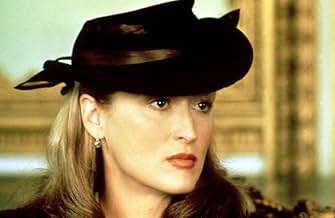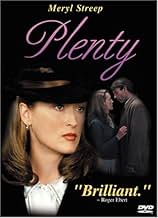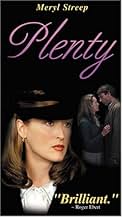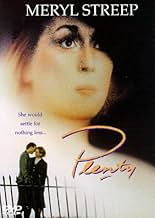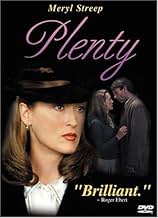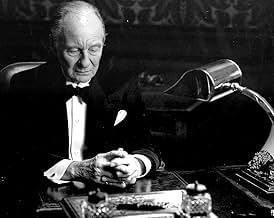NOTE IMDb
6,0/10
3,5 k
MA NOTE
Une jeune Anglaise passe vingt ans à se construire une vie, aux dépens de son entourage, dans l'Angleterre de l'après-guerre.Une jeune Anglaise passe vingt ans à se construire une vie, aux dépens de son entourage, dans l'Angleterre de l'après-guerre.Une jeune Anglaise passe vingt ans à se construire une vie, aux dépens de son entourage, dans l'Angleterre de l'après-guerre.
- Nomination aux 2 BAFTA Awards
- 2 victoires et 5 nominations au total
André Maranne
- Villon
- (as Andre Maranne)
Histoire
Le saviez-vous
- AnecdotesThe original Broadway production of "Plenty" by David Hare opened at the Plymouth Theater in New York City on January 6, 1983, and ran for ninety-two performances until it closed on March 27, 1983. The play was nominated for four Tony Awards in 1983, including Best Play. Also, the play won the New York Drama Critics' Circle Award for Best Foreign Play of the 1982 to 1983 season.
- GaffesQueen Elizabeth II's coronation was in 1953, yet the flag display in the background includes the Canadian "maple leaf" flag which was not adopted until 1965.
- Citations
Susan Traherne: I would stop, I would stop, I would stop fucking talking if I ever heard anybody else say anything worth fucking stopping talking for!
- ConnexionsFeatured in At the Movies: Crossover Dreams/Maxie/Mishima/Plenty (1985)
Commentaire à la une
This much-overlooked British drama opens with, literally fades in on, her days in WWII France. It follows her through the next 15 or 20 years, and ends with an aching scene from a past day when she thought tomorrow seizes nothing but good things for her. But nothing else in her life is ever as valuable, as dignifying or as exciting as the war. She is, maybe, a little insane. She divulges in one scene that she has a considerable issue: "Sometimes I like to lose control."
Fred Schepisi's obscure film stars Meryl Streep and it is a performance of daring delicacy. It is hard to play an irrational, maladjusted, quasi-suicidal woman with such tenderness or grace. She is oftentimes quite charming to be around for the other characters, and when she is letting herself fall short of restraint, she doesn't do it in the vein of those exclusive movie frenzy scenes but with a relatively pleasant imperativeness.
When she returns to England after the war, she makes friends with a round-faced, grinning imp played by a refreshing Tracey Ullmann. Another is Charles Dance's foreign service officer who is initially charmed by her casual, free-spirited lifestyle, and then marries her and becomes her permanent aggrandizer, putting up a barricade of composure and practically divine patience around her tantrums.
It is challenging to pigeonhole specifically what it is that disturbs Streep's character. Early on, David Hare's screenplay shepherds us to her own heuristic that after the valor and brazenness of the war, after the gallantry and the passion, it is beyond absurd to her to readjust back to normal life and endure the tedious small talk of civil commonality. Yet as the film proceeds in a clandestine manner of being episodic, we find there is something persistent, a little vicious, in the way she humiliates her husband at crucial times, constantly seeking to be tactless and incongruous. Ultimately, we gravitate toward his position when he eventually thunders that she is hateful and pitiless, and oblivious to those who have withstood her.
But then there is an postlude, moistened by the misty twilight of the most dismal hour of fall, and there is such despondence in the way she and another character both become conscious that nothing will ever graze them again the way the war did. This bit part-filled movie is conclusively not a assertion concerning war, or foreign service, or middle-class British, but just the story of this lost woman who at one time lived profoundly, and now finds that she is barely even living.
The performances grant one enthralling solitaire after another. Most of the pivotal instances come as different characters eclipse different scenes. Streep births a complete character around a woman who could have merely been a hit list of problems. Charles Dance has an unrewarding part, as her perpetually agonized husband who from the beginning seems like a very dull bureaucrat, but survives to show that he is respectable as well as foolish. Sting plays a commonplace young man who ineffectively tries to conceive Streep's child for her. John Gielgud has three small scenes and steals them all, which essentially is the story of his career. Plenty is written, acted and directed as a lather of refinement and delicate shrewdness, underneath which grows the revelation that life can often be futile, dull and depressing, and that there can be days, months, years, decades in accordance.
Fred Schepisi's obscure film stars Meryl Streep and it is a performance of daring delicacy. It is hard to play an irrational, maladjusted, quasi-suicidal woman with such tenderness or grace. She is oftentimes quite charming to be around for the other characters, and when she is letting herself fall short of restraint, she doesn't do it in the vein of those exclusive movie frenzy scenes but with a relatively pleasant imperativeness.
When she returns to England after the war, she makes friends with a round-faced, grinning imp played by a refreshing Tracey Ullmann. Another is Charles Dance's foreign service officer who is initially charmed by her casual, free-spirited lifestyle, and then marries her and becomes her permanent aggrandizer, putting up a barricade of composure and practically divine patience around her tantrums.
It is challenging to pigeonhole specifically what it is that disturbs Streep's character. Early on, David Hare's screenplay shepherds us to her own heuristic that after the valor and brazenness of the war, after the gallantry and the passion, it is beyond absurd to her to readjust back to normal life and endure the tedious small talk of civil commonality. Yet as the film proceeds in a clandestine manner of being episodic, we find there is something persistent, a little vicious, in the way she humiliates her husband at crucial times, constantly seeking to be tactless and incongruous. Ultimately, we gravitate toward his position when he eventually thunders that she is hateful and pitiless, and oblivious to those who have withstood her.
But then there is an postlude, moistened by the misty twilight of the most dismal hour of fall, and there is such despondence in the way she and another character both become conscious that nothing will ever graze them again the way the war did. This bit part-filled movie is conclusively not a assertion concerning war, or foreign service, or middle-class British, but just the story of this lost woman who at one time lived profoundly, and now finds that she is barely even living.
The performances grant one enthralling solitaire after another. Most of the pivotal instances come as different characters eclipse different scenes. Streep births a complete character around a woman who could have merely been a hit list of problems. Charles Dance has an unrewarding part, as her perpetually agonized husband who from the beginning seems like a very dull bureaucrat, but survives to show that he is respectable as well as foolish. Sting plays a commonplace young man who ineffectively tries to conceive Streep's child for her. John Gielgud has three small scenes and steals them all, which essentially is the story of his career. Plenty is written, acted and directed as a lather of refinement and delicate shrewdness, underneath which grows the revelation that life can often be futile, dull and depressing, and that there can be days, months, years, decades in accordance.
Meilleurs choix
Connectez-vous pour évaluer et suivre la liste de favoris afin de recevoir des recommandations personnalisées
- How long is Plenty?Alimenté par Alexa
Détails
- Date de sortie
- Pays d’origine
- Langue
- Aussi connu sous le nom de
- Eine demanzipierte Frau
- Lieux de tournage
- Sociétés de production
- Voir plus de crédits d'entreprise sur IMDbPro
Box-office
- Budget
- 10 000 000 $US (estimé)
- Montant brut aux États-Unis et au Canada
- 6 148 000 $US
- Week-end de sortie aux États-Unis et au Canada
- 436 266 $US
- 22 sept. 1985
- Montant brut mondial
- 6 148 000 $US
- Durée2 heures 1 minute
- Mixage
- Rapport de forme
- 2.35 : 1
Contribuer à cette page
Suggérer une modification ou ajouter du contenu manquant



